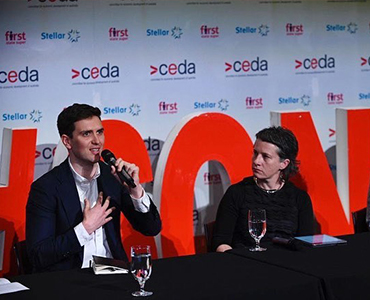The National Disability Insurance Scheme is a model for “enormous ideas that can change the future for all of us,” Hireup Chief Executive Officer, Jordan O’Reilly, told CEDA State of the Nation.
 Mr O'Reilly was joined by a panel that included Westpac Group Head of Sustainability, Siobhan Toohill and Federal Department of Social Services Secretary, Kathryn Campbell AO CSC to discuss ways of addressing entrenched disadvantage and strengthening the social compact.
Mr O'Reilly was joined by a panel that included Westpac Group Head of Sustainability, Siobhan Toohill and Federal Department of Social Services Secretary, Kathryn Campbell AO CSC to discuss ways of addressing entrenched disadvantage and strengthening the social compact.
Ms Campbell opened the discussion with a broader perspective on social inequality, referencing the Productivity’s Commission’s finding that “there is still a percentage of the population who, despite a number of government programs and other initiatives, continue to experience entrenched disadvantage”.
“Looking at this population…we found that the interventions that might be able to come up with better results were very much place based and focused on individuals and their families,” she said.
“People are much more likely to go to not for profits in their local community and they are not as keen to come to government. They see government as a support base but they also see the community there and that is something they are much more familiar with.”
Speaking further to this point, Ms Toohill noted that “we are seeing a greater shift on outcomes for individuals and communities.”
“There is an expectation that modern society has the mechanisms to help those that need help most, and that government, the not for profit sector and business each has a role to play in supporting that ambition,” Ms Toohill said.
Ms Campbell echoed Mr O’Reilly’s praise for the NDIS but acknowledged that there have been “teething problems” along the way.
“The NDIS is an amazing scheme…that offers great opportunity for choice and control for people with disability,” she said.
“Choice and control can be seen as a structure or just a good public policy principle, but when you see the people and families on the ground who are making decisions and getting access to services, sometimes for the first time ever… you see the difference it makes to their lives.”
On the issue of cross-sector and cross-governmental collaboration to solve issues of inequality, Mr O’Reilly spoke to the value of an “ecosystem approach”.
Reflecting on his experiences developing HireUp, an online platform for connecting people with disabilities to disability support workers, Mr O’Reilly said that “after finding no opportunity to break in, it was really through venture philanthropy that we got the business going”.
“So many of the problems that people face are in the hearts and minds of people themselves. We just have to think about this as an ecosystem…taking the best of philanthropy, of impact investing and more traditional sources of finances to find those entrepreneurs with the ideas that can make a difference,” he said.
Addressing the question of how data can be used in the social impact space, Ms Campbell said that “we already have a lot of data, we just need to start asking the right questions. It is about having the discipline and the connections with the not for profit sector to see what questions to ask.”
Building on this point, Mr O’Reilly said that “the flipside of the coin of the data question is the innovation question.”
“We need to back people in communities that are facing some of these challenges to have a crack. There is a delicate balance between getting the rigorous data in place but also having that opportunity and ecosystem in place,” he said.